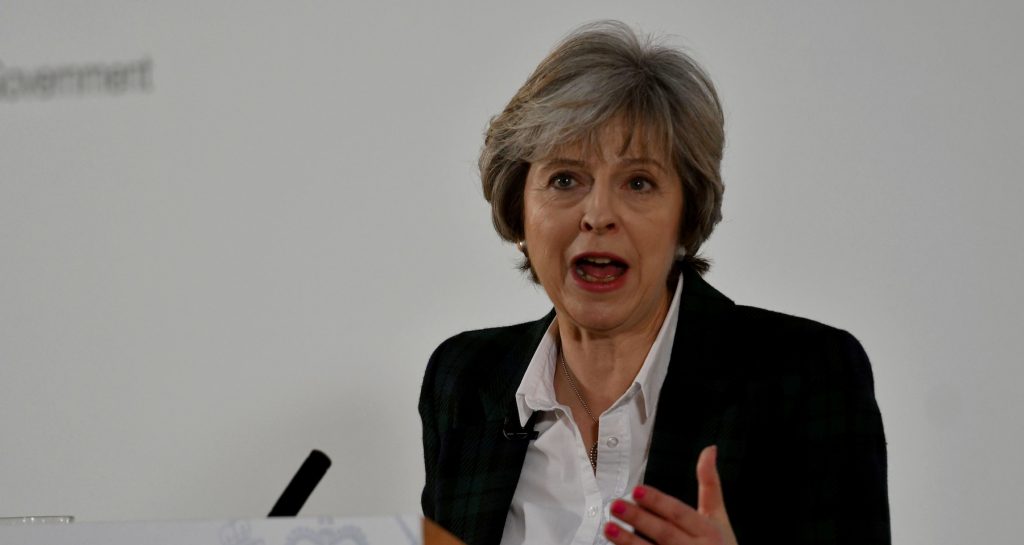
Do we finally know what Brexit means?
What exactly Brexit is has been the biggest enigma of our times. A code so closely-guarded, it would have taken a mind like Sherlock Holmes to unravel exactly what the UK population’s decision to leave the EU might mean.
After keeping the cards firmly to her chest, Theresa May has finally laid out her “action plan”. So what are the key points? Is anything any clearer? In the absence of Cumberbatch and Doctor Watson, we try and get to grips with the big speech.
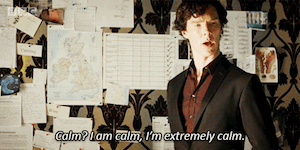
As far as we can tell, these are May's main points, dejargoned...
Britain will leave the single market and negotiate its own ‘bold comprehensive free trade agreement’, which she says will make trade with the EU as ‘frictionless as possible’
A single market is an agreement between a group of countries that, for economic purposes, behave as if they were one country. So, for example, it would be as easy for a business in the UK to sell to a customer in Munich as in Manchester. For that to happen, goods, services, capital and people need to be able to move freely.
Any country in the world can sell to country in a single market, but there will be certain taxes, or on goods. What those tariffs are will depend on the country’s trade agreement. In this case May’s “bold, comprehensive and free” one. That’s the main thing she’ll have to negotiate, come Brexit Day.
Budget contributions to the EU will ‘come to an end’
This one seems quite clear. If you think back to the now infamous claim that the UK would have “£350m more a week” for the NHS if it left the EU, this is basically what leave campaigners were talking about. Although campaigners said after the referendum they weren’t exactly certain about that figure, it was clear people were fed up of paying into the EU's budget.
The problem is, Theresa May is saying she wants as close to full single market access as possible. If you think about the budget contributions as a membership fee that allows you access to the market and its services and trade standards, then it seems hard to imagine that the EU will let Britain get such a favorable deal, without having to pay its way. Chief EU parliament negotiator Guy Verhoefstadt has already warned that the UK’s days of ‘cherry picking Europe a la carte’ are over, so this won’t be easy to negotiate.
Immigration must be lowered to only “the best and the brightest”
Human capital is the idea that people and the work they do produces economic value. So, if the EU is based on the principle that labor, capital, goods, and services can move freely, Theresa May is saying here that it’s only worth bringing someone into the nation if they are a particularly productive member of society. Human capital is generally used to talk about the economic power of all human skills. The implication in Theresa May’s speech is that it is most useful to Britain’s economy to have people filling the talent gaps at the top of the economic pyramid than at the bottom.
Britain will continue to share intelligence and research and development knowledge for science and innovation with the EU
The UK has a long history of collaboration with European countries in science and universities. She wants to clarify that she’d still like to benefit from the knowledge of all 27 member states. Britain is already part of research projects with other EU member states, many of which are dependent on EU funding, and she doesn't want people to think that this, or Britain's place as a country of innovation, is threatened. This is interesting because of the distinction she makes between knowledge and other aspects of trade. For all the other goods and services which are part of a competitive and limited market she wants out, but for something like this where more is always better, she wants in.
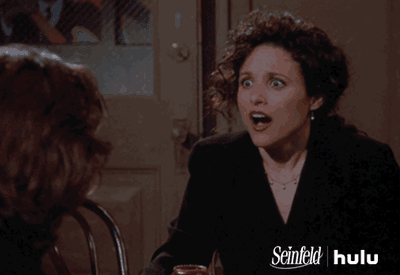
She also made some pretty big statements about the UK and its importance in the world…
Here are some lines from the speech.
“If we were excluded from accessing the single market – we would be free to change the basis of Britain's economic model. But for the EU, it would mean new barriers to trade with one of the biggest economies in the world... I do not believe the EU's leaders will seriously tell German exporters, French farmers, Spanish fisherman, the young unemployed of the Eurozone, and millions of others, that they want them to be poorer, just to punish Britain..."
“Britain is not the only member state where there is a strong attachment to accountable and democratic government, such a strong internationalist mindset, or a belief that diversity within Europe should be celebrated. And so I believe there is a lesson in Brexit not just for Britain but, if it wants to succeed, for the EU itself.”
“The second reason I believe it is possible to reach a good deal is that the kind of agreement I have described today is the economically rational thing that both Britain and the EU should aim for. Because trade is not a zero sum game: more of it makes us all more prosperous. Free trade between Britain and the European Union means more trade, and more trade means more jobs and more wealth creation. The erection of new barriers to trade, meanwhile, means the reverse: less trade, fewer jobs, lower growth.”
So what was she saying?
What does she mean by a new “economic model”? It’s not something you often hear in this context. An economic model isn’t some kind of far-off complicated structure, or even an algorithm. It’s just a set of assumptions about the economy – things like, “people always make good decisions”, “People prefer higher salaries over lower ones”, or "When interest rates are high people will save,” that politicians and economists use to make decisions about the economy. So is Theresa May saying here that the UK is going to have a whole new set of assumptions if the EU plays hard ball and doesn’t give her the deal she wants?
In the second quote, is she saying that you can’t have those values – of accountability and democracy – inside the EU? This seems very much like an assertion of opinion here, not a balanced judgement. Throughout her speech she is trying to make the case that Britain is the strong, democratic and powerful country she believes it has always been. In fact, our values counter was going haywire here. She said ‘strong’ 18 times, ‘global’ 16 times, ‘fair’ 9 times, ‘a great, global nation’ 5 times and ‘free trade’ 10 times. Anyone for a drinking game?
Again, this is May’s opinion. It seems hard to believe that this is the only rational way forward. Also, does trade always make everyone more prosperous? The value of trade to a country depends on the strength and the power play between the two people trading, which is something May will need to remember when she’s negotiating.
Here are some of our favourite headlines this morning...
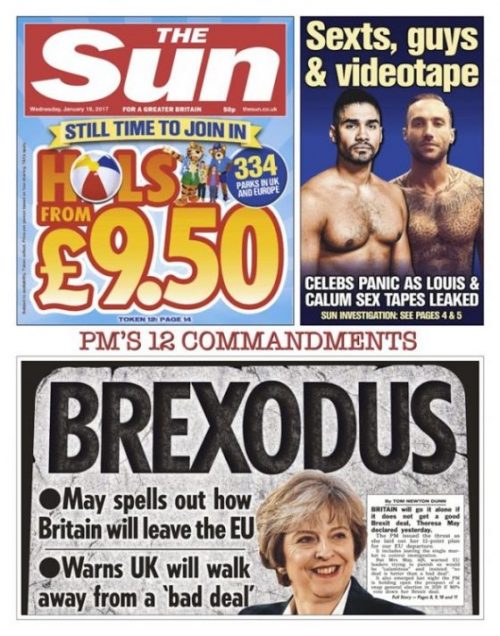
How many more ways to say it are there?
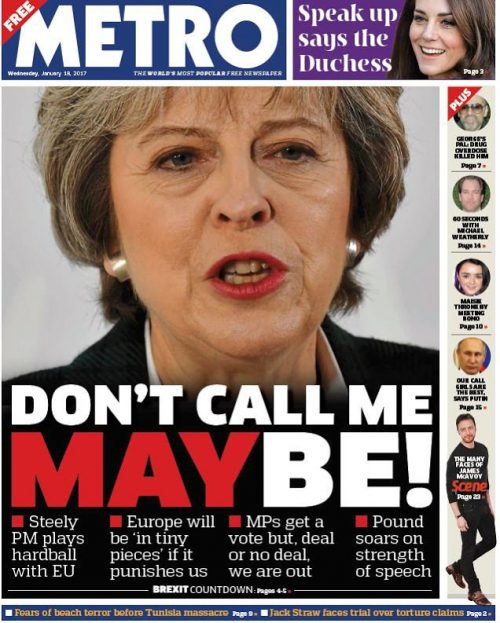
But we only just met you...
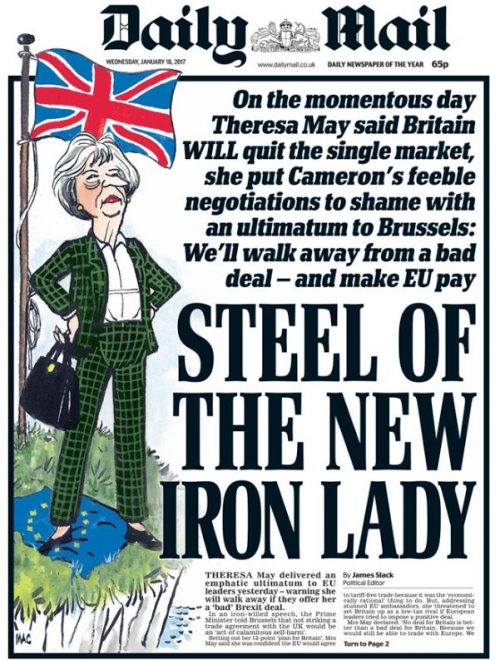
Not for turning...
So what is there still to find out?
Theresa May set out what she thinks, but how that will play out is still very much up in the air. There are still some big questions to answer. For example,
- What level of access to the single market will May be able to negotiate in her free trade agreement?
- What will the deal for EU citizens here and British citizens there be exactly?
- How will the border with the Republic of Ireland work?
- Will Scotland have another independence referendum?
Sounds like there's lots more to come.



